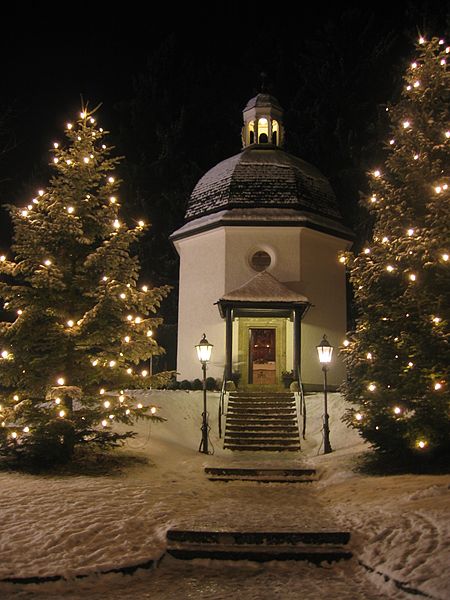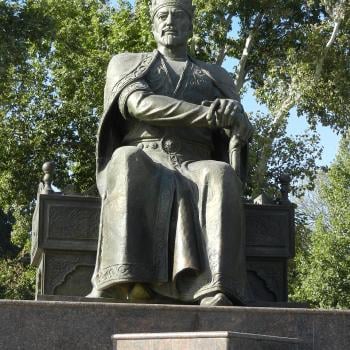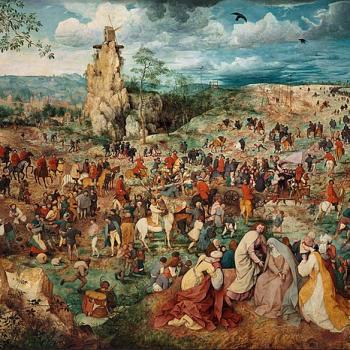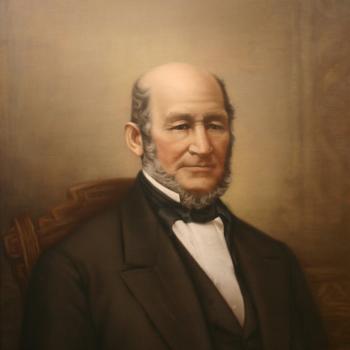
(Wikimedia Commons public domain image)
I know. I know. I already mentioned Es ist ein Ros entsprungen here a couple of weeks ago. But it’s so beautiful that I can’t simply omit it from this rundown of favorite Christmas pieces. I still vividly remember the exquisite thrill that went through me when, many years ago, I first heard it sung by a small Latter-day Saint branch choir in Interlaken, Switzerland. The sheer beauty of it entranced me. And it still does. I love the melody. But I also love the lyrics, the message. And, alas, I’ve never seen an English translation that does them justice. But here, anyway, is a nice version of the piece:
https://www.youtube.com/watch?v=7RjAXOcTebI
***
The same holds true for Morten Lauridsen’s setting of O magnum mysterium. I’ve already mentioned it here this month, but, in my opinion, it’s one of the most unearthly and beautiful pieces of modern classical Christmas music and it simply cannot be committed from this little three-part series of some of my favorite pieces of Christmas music:
- Latin text
- O magnum mysterium,
- et admirabile sacramentum,
- ut animalia viderent Dominum natum,
- jacentem in praesepio!
- Beata Virgo, cujus viscera
- meruerunt portare
- Dominum Christum.
- Alleluia.
- English translation
- O great mystery,
- and wonderful sacrament,
- that animals should see the new-born Lord,
- lying in a manger!
- Blessed is the Virgin whose womb
- was worthy to bear
- Christ the Lord.
- Alleluia!
***
I’ve always loved Gustav Holst’s beautiful setting of Christina Rossetti’s “In the Bleak Midwinter.” Listen, here, to choir and congregation sharing the wonder of the piece and its message:
***
Craig Foster brought this rendition of “Silent Night” to my notice just tonight. It’s by Enya, who sings it in Irish under the title of “Oíche Chiúin”:
***
Like so much other wonderful music, Still, Still, Still comes from Salzburg. (Among other things, a fellow named Mozart was born there.)
The very title seems to put me right into German mode: I actually began, just now, to write that “Like so much wonderful music, Still Still Still kommt aus Salzburg.”
The standard lyrics read like this:
- Still, still, still,
- weil’s Kindlein schlafen will!
- Die Engel tun schön jubilieren,
- Bei dem Kripplein musizieren.
- Stille, stille, stille,
- Weil’s Kindlein schlafen will.
- (2) Schlaf, schlaf, schlaf,
- Mein liebes Kindlein, schlaf!
- Maria tut dich [es] niedersingen
- Und ihr treues Herz darbringen.
- Schlaf, schlaf, schlaf,
- Mein liebes Kindlein, schlaf!
- (3) Groß, groß, groß,
- Die Lieb’ ist übergroß.
- Gott hat den Himmelsthron verlassen
- Und muß reisen auf der Straßen.
- Groß, groß, groß,
- Die Lieb’ ist übergroß.
- (4) Auf, auf, auf,
- Ihr Adamskinder auf!
- Fallet Jesum all zu Füßen,
- Weil er für uns d’Sünd tut büßen!
- Auf, auf, auf,
- Ihr Adamskinder auf!
- (5) Wir, wir, wir,
- Wir rufen all zu dir:
- “Tu uns des Himmels Reich aufschließen,
- Wenn wir einmal sterben müssen.
- Wir, wir, wir,
- Wir rufen all zu dir.”
- (6) Ruh’t, ruh’t, ruh’t,
- Weil’s Kindlein schlafen tut.
- Sankt Josef löscht das Lichtlein aus,
- Die Englein schützen’s kleine Haus.
- Ruh’t, ruh’t, ruh’t,
- Weil’s Kindlein schlafen tut.
And here’s my rough, non-artistic, literal translation:
- Quiet, quiet, quiet,
- because the little child wants to sleep!
- The angels are beautifully rejoicing,
- making music by the little crib.
- Quiet, quiet, quiet,
- because the little child wants to sleep!
- (2) Sleep, sleep, sleep,
- My dear little child, sleep!
- Mary is singing a lullaby to you
- and offering her faithful heart.
- Sleep, sleep, sleep,
- My dear little child, sleep!
- (3) Great, great, great,
- the love is immensely great.
- God has left his heavenly throne
- And now must travel on our streets.
- Great, great, great,
- the love is immensely great.
- (4) Up, up, up,
- You children of Adam, get up!
- Fall, all of you, at Jesus’ feet,
- Because he atones for all our sins!
- Up, up, up,
- You children of Adam, get up!
- (5) We, we, we,
- We all call to thee:
- “Open the Kingdom of Heaven to us,
- when we someday must die.
- We, we, we,
- We all call to thee.”
- (6) Be still, be still, be still,
- because the little child is sleeping.
- Saint Joseph puts the little light out,
- The little angels guard the tiny house.
- Be still, be still, be still,
- because the little child is sleeping.
***
When John Menzies Macfarlane, a Scottish convert to the Church of Jesus Christ of Latter-day Saints, needed a special song for Christmas 1869 for the choir that he conducted in St. George, Utah, he wrote one. (St. George had only been founded in 1861, and it was still a very small and rough little settlement struggling to survive in an arid desert climate; its tabernacle and temple were still several years in the future.)
Here is the song that he wrote, in a performance by the Tabernacle Choir and the Orchestra at Temple Square:
https://www.lds.org/media-library/video/2013-12-0031-far-far-away-on-judeas-plains?lang=eng
“Far, Far Away on Judea’s Plains” was first published in Salt Lake City’s Juvenile Instructor twenty years later, in 1889. Since then, it has become a popular Christmas carol well beyond the confines of the Latter-day Saint community — one of the relatively few “Mormon” hymns to travel across denominational lines. It was, I think, my favorite Christmas carol when I was a child.
Brother Macfarlane got “Judea’s Plains” wrong, though. There are none. There’s not a flat place in Judea. It’s barren hill country.
***
The great lyric soprano Renée Fleming joins the Tabernacle Choir and the Orchestra at Temple Square for a performance of What Child is This?
https://www.youtube.com/watch?v=1VmADpBVmCw
Posted from Bountiful, Utah












